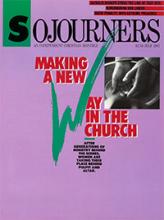I FIRST PERCEIVED THAT I WAS CALLED to the ministry of the Word while I was in college. However, it was clear to me at that time that I should not immediately go to seminary but rather allow my ministerial skills and abilities to develop through the actual experience of preaching, teaching Sunday school, leading Bible study groups, and doing campus ministry. I joined the ministerial staff of my home church, Third Street Church of God, in Washington, D.C., and participated in Bible study groups with government workers and with undergraduates at Howard University.
Eventually I moved to Boston to pursue a Master of Divinity degree and a doctorate in theology, preparing myself thoroughly to pursue a dual calling to pastoral ministry and teaching ministry. A precipitating factor in this pursuit was my conviction that seminary professors ought to bring to the classroom concern for and involvement in parish ministry, and that pastors ought to bring to parish ministry a forthright commitment to excellence in religious education. I see myself now as being in an ideal position to advocate for women's concerns in the church and to promote feminist scholarship in the seminary.
I was ordained to the ministry by the Church of God. The Church of God has acknowledged the call of women to preaching and pastoral ministry throughout its more than 100 years of existence, so ordination of women has not been an issue. However, women have had difficulty finding placement as pastors in Church of God pulpits. It is ironic to note that there were proportionately many more women pastors in the early days of the Church of God than at present.
Read the Full Article

